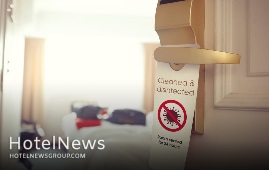
Hospitality, at its core, is an industry of people taking care of people, and has a long-standing commitment to cleanliness and service standards. While the housekeeping team is central in the delivery of those standards, it operates in the background, out of view. Room attendants and supervisors moved around discreetly to be as invisible as possible. However, COVID-19 has thrust housekeeping into the limelight. As COVID has led to a surge in public health awareness, hotels are now put in a position of making their commitment to cleanliness part of their guest experience. Rethinking operations, and re-designing housekeeping operations using technology is the only way to achieve the productivity and quality that is required. At Knowcross, we focus on three central housekeeping areas: staff productivity, cleaning quality, and guest experience. We have moved swiftly to enhance our products to adapt to the negative impact COVID-19 has had on each of these areas. The unpredictability of the virus means that your hotel must be vigilant in its adherence to new health and safety protocols. Your housekeeping technology has a critical role here and it serves several purposes. First, it underlines that health and safety should always be top of mind every day and that your hotel fosters a culture of accountability. Secondly, health checks and associated reporting help support contact tracing in the event there is a positive test amongst the team. Quicker containment means that the hotel itself can be protected from shutdown and, most importantly, your staff stays safe. Lastly, health checks communicate to your staff that you are looking out for one another. New Cleaning Protocols Hospitality industry was quick to roll out an extensive list of cleaning and safety protocols after COVID-19 erupted. Housekeeping operations must support changes such as the elimination of high-touch items in guest rooms, dedicated ‘cleanliness’ teams and the intensive sanitisation of common areas and guest rooms. All of these changes impact staffing assignments and cleaning times, which have a direct impact on guest experience. The truth is that most hotels, unfortunately, have had to let staff go, resulting in more work for the remaining people. Your housekeeping software must include the configurability to support these variations without adding manual management time. For example, when creating housekeeping tasks, you may now need to a “sanitation > full cleaning > inspection > sanitize & seal” cycle to prepare a departure room for a new arrival. Your system should support this new task structure while also accounting for the time and labor requirements. At Knowcross, we’ve done this with a fully automated system called Dynamic Task Sheets that eliminate the need for a central coordinator in housekeeping to constant- ly create task sheets and juggle staff and rooms among them. In some geographic areas, we have witnessed rules pertaining to a limited percent- age of rooms in active rotation, with accompanying cleaning cycles. Once again, your housekeeping operations software should make the rotation and sanitation of room blocks simple, with few manual adjustments. Conclusion New housekeeping technology enhancements have kept up with changing COVID-19 requirements, but it must be remembered that those hotels with housekeeping management automation solutions were already enjoying the labor efficiencies that are now so sought after across the industry. Whether it’s using PMS data to map cleaning schedules, instantly communicating room status, or providing mobile at-a-glance guest histories, technology can improve productivity and accuracy of housekeeping departments – a must-have in the post COVID world. I have no doubt that intelligent, data-driven housekeeping operations will soon become the norm and hotels will find new, innovative ways to deliver superior guest experiences that today’s travelers yearn for more than ever.
Create: Jun 20, 2021 Edit: Jun 20, 2021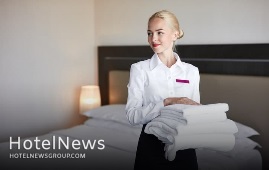
Cleanliness is not just about COVID-19 safety but also giving guests peace of mind through the presentation of visual cues that you are in fact abiding by the proper sanitization guidelines. Little things like a protective wrapper around the guestroom toilet seat or spraying down the lobby at peak hours instead of after midnight go a long way towards rebuilding traveler confidence. These are but two examples of what we coined as ‘cleanliness theater’ while others have deployed similar phrasing like ‘hygiene theater’ or ‘high-visibility cleaning’. Importantly, even as we transition out of the pandemic, this theater of cleanliness will continue to play a role, albeit unconscious but nevertheless emotional, towards guest satisfaction and brand loyalty for the decade ahead. The most salient consideration pertains to the marketing of cleanliness, both onsite for satisfaction and during the booking phase. For this, we argue that the theater takes precedent over the actual strictness of sanitization techniques deployed in the buyer’s decision-making process. That is, from a psychological standpoint, this theater – more specifically, visual cues symbolizing good cleanliness practices – serves as a heuristic or mental shortcut to indicate that you are taking the matter seriously so that the prospective guest can check the COVID-19 safety box and move on to other considerations like location, price, in-room features and onsite amenities. Given that heuristics favor the theater over the BOH production, hoteliers should thus rethink how they leverage all their new sanitization SOPs for their marketing efforts. Stated differently, highly visible theater will give guests a quick reference point to heighten their confidence so that they make a reservation at your property versus others in your comp set, as well as recommend your hotel to others once they depart. Besides the listing of various cleanliness badges on your website and in your newsletters, one such idea is to recruit a ‘clean ambassador’. This could be a new job title linked to the front desk or concierge, or the responsibility could be given to the executive housekeeper, helping move this vital BOH role into the limelight plus the same as the executive chef position has over the past two decades. As an aside, before the pandemic we often joked that the executive housekeeper was the most important role at a hotel because any guestroom cleaning infractions would cause umbrage on TripAdvisor and potentially cause thousands of dollars in lost revenue from a single bad review. What’s funny is that, even prior to the coming of the coronavirus, the average hotel room was astronomically cleaner than the average person’s house. And yet, with the pandemic forcing us all to up our game, perhaps it’s time that executive housekeepers finally get the recognition they deserve. In any case, to express your cleanliness in a theatrical manner to help reinvigorate your property for Q3 and Q4 2021, one other idea is to produce a quick video hosted by your clean ambassador who would then check in on the room attendants, laundry workers, wait staff or bellhops to ensure they were staying safe. Such a video might also include B-roll of new COVID-19 signage, custodians using electrostatic sprayers in the corridors, disinfecting mobile devices with UV-C, or happy guests traversing the lobby while wearing masks and following physical distancing markers on the floor. Static photos telling a similar story can also work. The overall lesson here is that, with cleanliness staying top-of-mind for hotels and travelers for the next few years at least, you need to think differently in terms of how your brand to the world. Hygiene in and of itself doesn’t pluck at the heartstrings of your target audience, but the heuristic of hygiene does.
Create: Jun 13, 2021 Edit: Jun 13, 2021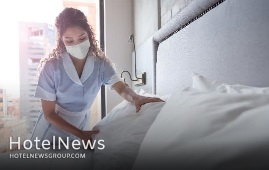
The challenges the hospitality industry has faced in the wake of COVID-19 reminds us how critical the housekeeping department’s role is to a hotel’s overall success. The urgency to prevent the spread of COVID-19 has accelerated change in our industry, including the need for new hygiene and cleaning processes. Even before the virus, 78% of hotel guests believed cleanliness to be the most crucial factor affecting their choice of where to stay, with hotel cleaning protocols moving up to the #1 top-ranked category for travel with COVID-19. As guests expect the highest standards of sanitation to feel at ease in a hotel and once again return to travel, operators worldwide need to work with their housekeeping teams to better prepare for the impacts of these new realities. By using this time to further analyze housekeeping practices, hotel leaders have an opportunity to take advantage of advancing technologies to more accurately plan for operational shifts that, at the end of the day, influence bottom-line results. Here are a few ways hoteliers can prepare their housekeeping team for success in 2021. 1. Create a Structured Cleaning Program Using Industry Best PracticesTo earn guest confidence, hotels will have to demonstrate that they provide a clean and safe environment and are following specific disinfecting protocols. As part of this new dynamic, the ability to develop and implement proven strategies to meet these new cleanliness standards will be critical to staying ahead of the competition. This is a good opportunity to establish clear step-by-step standard operating procedures (SOPs) for the protocols needed to enhance cleaning regimens. Creating a distinct checklist for each area of the property, including the lobby, restrooms, common areas, fitness center, and guest rooms, will help to ensure nothing gets missed. Hotels can look to their brand or management company for guidance on a structured program, or they can leverage one from trusted industry organizations like the AHLA’s Safe Stay program or Amadeus’ disinfecting housekeeping checklist, endorsed by the International Executive Housekeeping Association (IEHA). 2. Alter Schedules for Guest Room Cleaning Based on NeedMany hotels are shifting away from daily cleaning with automatic opt-out cleaning programs, leading to, in some cases, dirtier rooms upon departure. At the same time, the enforcement of new hygiene protocols, including the expansion of high touchpoints and frequency of cleaning, can increase the amount of time needed to spend in a room. Updated practices on the use of disinfectants and surface dwell times can additionally alter the flow in which rooms are serviced. So, what does this mean for housekeeping and operational teams? The rise in guestroom cleaning times can make forecasting labor and servicing pop-up requests a more complex endeavor. Lack of planning for additional time can also cause strain on staff, while last minute modifications to departure room schedules can impact room readiness. By tracking and analyzing the labor and resources needed to execute the tasks these rooms now require, hotels can adjust to new cleaning schedules, while identifying valuable areas for improvement that will ultimately increase both staff and guest satisfaction. 3. Monitor How Many Hours Guest Rooms are VacantAs new guidance is issued for businesses to mitigate the risk of COVID-19, the procedures within hotels also need to adapt. For instance, the American Hotel & Lodging Association (AHLA) recommends rooms be left vacant for 24-72 hours prior to or after cleaning if possible, while China requires hotels that host international guests to change linens and clean guestrooms and bathrooms daily. Consumers are increasingly calculating risks associated with travel and want to have complete transparency when it comes to COVID-19-specific protocols before even booking a hotel room. The ability to promise, then track and report the number of hours a room is vacant is a must in today’s business environment. 4. Understand Which Rooms are Not Being Serviced and WhyStreamlining productivity may mean having to leave rooms not serviced for the day. Although a part of daily housekeeping, one of the biggest challenges is measuring why a room was not serviced, or “dropped”. Perhaps there is a need to alter opt-out programs. Perhaps there is a need for more staff. Having the ability to identify, record, and flag rooms with a special service status like “dropped rooms” allows teams to truly understand why rooms are not being serviced. This process allows housekeeping managers to schedule staff effectively, as well as audit and reconcile room counts at the end of each day to optimize operations. With today’s lack of time and budget, gaining important insights into dropped rooms is pivotal to every housekeeping team’s success. 5. Leverage Automation to Drive ProductivityAs we evaluate new ways to face the challenges ahead, hotel leaders must consider how innovation can play a critical role in closing the gaps between team capabilities and achieving business goals. The right hotel technology can be a powerful tool in the decision-making process by reaching across the hotel’s ecosystem to orchestrate proactive tasks such as automating room assignments, schedule turnovers, and reprioritizing work. Gaining valuable insights from automation dashboards and reporting tools can also enable better decision making in a world of unknowns. Whether it’s wiping down frequently used areas like elevator buttons, delivering guest requests like soap or chargers, or managing dropped or vacant rooms, modernizing processes with a housekeeping solution can help to maximize operational capabilities while ensuring the highest standards are met. During times of unpredictability, the ability to intelligently automate the prioritization, communication, and dispatching of the entire housekeeping operation is more valuable than ever. This way, limited time and budget is spent where it is needed most. Resetting for 2021 and BeyondMoving forward, there will be no greater focus from a guest’s perspective than a hotel’s commitment to its cleaning initiatives. Resetting for success in 2021 and beyond means understanding how technology can significantly enhance our capabilities as individuals and designing new business procedures that support it. Reflecting this dynamic presents an opportunity to lead the way in delivering the processes needed to support both housekeeping teams and guest confidence in this new era of hospitality.
Create: Feb 9, 2021 Edit: Feb 9, 2021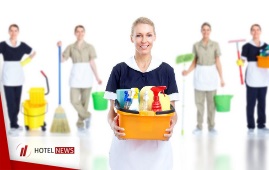
Along with the bedroom area, there are some simple bathroom housekeeping elements to always consider: Room is free of odor Floor, sink, shower and walls are spotless Lightbulbs all working (again) Ample space for toiletries Plenty of clean towels, bath tissue and toilet tissue.
Create: May 2, 2019 Edit: May 4, 2019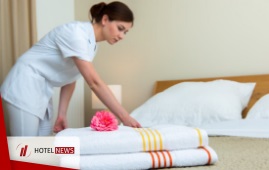
Here are some simple tips that can help make your staff (and rooms) shine: As we all know, a great overall experience goes well beyond the condition and cleanliness of the room, but there are some simple elements to which you must always attend: No scuff marks on the walls or baseboards All lightbulbs in working order (this is one of my pet peeves and happens a lot) Television channel card and remote present and/or easily found Alarm clock with the correct time displayed Alarm is off (admit it: you’ve been awakened at 5 a.m. too) Telephone instructions available and easy to find Closets neat and have a sufficient amount of hangers (eight or more) Ceiling is free of cobwebs and stains Underneath the bed(s) is free of dust and debris (guests sometimes place items here).
Create: May 2, 2019 Edit: May 3, 2019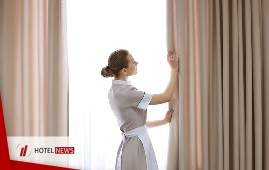
After cleaning the guest room: Inform the guest that the room cleaning is finished “Mr/Mrs/Ms ________ your room has been serviced" Check for the guest satisfaction “Mr/Mrs/Ms _______ Everything is fine and comfortable in the room" Offer assistance in advance “Would you like me to call the restaurant reservation to book a table for you this evening?” If you are taking down a guest request, please ensure that they revert back to the guest with the confirmation. Leave the room quietly without disturbing the guest or making any noise. “Thank you very much Mr/Mrs/Ms _______ Have a wonderful evening”.
Create: May 1, 2019 Edit: May 2, 2019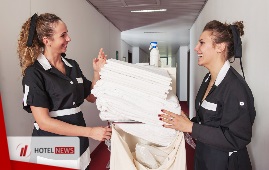
Knock on the door three times using your index finger or ring the doorbell Announce your self “Housekeeping”, Wait 15 seconds for reply. If there is no answer knock again (the standard is to knock thrice before entering a guest room) If the guest opens the door, say “Good Evening” Mr/Mrs XXX. I am (Your Name) from Housekeeping Can I Turn your bed and change the towels, replenish the amenities If guest says no ask the guest what time will be convenient to service the room Offer additional service if guest is in the room During turndown: Run an aromatic bath Order beverage for the guest Order early morning beverage
Create: May 1, 2019 Edit: May 2, 2019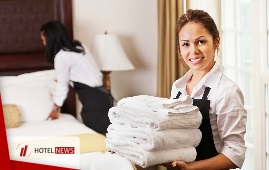
What are the Golden Rules we must follow when entering a guest room to Service the room 1. Turn down service Approach the main door of the Room and observe the sign on the door If there is a “Do not disturb” sign on the door – Slip a “service” card under the door and make note to return later to check whether the card has been removed
Create: May 1, 2019 Edit: May 2, 2019